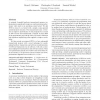Free Online Productivity Tools
i2Speak
i2Symbol
i2OCR
iTex2Img
iWeb2Print
iWeb2Shot
i2Type
iPdf2Split
iPdf2Merge
i2Bopomofo
i2Arabic
i2Style
i2Image
i2PDF
iLatex2Rtf
Sci2ools
212
click to vote
ASPLOS
2009
ACM
2009
ACM
Maximum benefit from a minimal HTM
A minimal, bounded hardware transactional memory implementation significantly improves synchronization performance when used in an operating system kernel. We add HTM to Linux 2.4, a kernel with a simple, coarse-grained synchronization structure. The transactional Linux 2.4 kernel can improve performance of user programs by as much as 40% over the non-transactional 2.4 kernel. It closes 68% of the performance gap with the Linux 2.6 kernel, which has had significant engineering effort applied to improve scalability. We then extend our minimal HTM to a fast, unbounded transactional memory with a novel technique for coordinating hardware transactions and software synchronization. Overflowed transactions run in software, with only a minimal coupling between hardware and software systems. There is no performance penalty for overflow rates of less than 1%. In one instance, at 16 processors and an overflow rate of 4%, performance degrades from an ideal 4.3? to 3.6?.
ASPLOS 2009 | Linux 2.4 Kernel | Linux 2.6 Kernel | Non-transactional 2.4 Kernel | Programming Languages |
Related Content
| Added | 22 Nov 2009 |
| Updated | 22 Nov 2009 |
| Type | Conference |
| Year | 2009 |
| Where | ASPLOS |
| Authors | Owen S. Hofmann, Christopher J. Rossbach, Emmett Witchel |
Comments (0)

